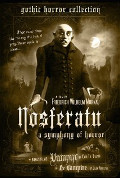
Germany 1921
Directed by
F.W. Murnau
90 minutes
Rated PG
Reviewed by
Bernard Hemingway


Nosferatu, A Symphony Of Horror
The first of many screen versions of Bram Stoker's 1897 novel, Dracula, this is not only probably the best adaptation ever but remains one of the most outstanding films of the silent era. Murnau appropriated the story, changed the names and did not give any credit to the author who died a poor man and whose widow sued, resulting in the destruction of most of the prints. Fortunately, as the ruling was only enforceable in England, some prints survived and this classic is still very watchable even for the non-specialist. Whilst Murnau's direction is impressive as is the photography by Fritz Arno Wagner, at the core of the film's success is Max Schreck's portrayal, arguably the most effective ever portrayal of the famous vampire.
The story involves the transmarine visit (Murnau and screenwriter Henrik Galeen added the sea voyage) of Jonathan Harker (Gustav von Wagenheim) to Count Orlok (Schreck) in remote Carpathian Mountains in Transylvania to close a real estate deal on an abandoned Bremen house the Count wishes to purchase. Jonathan is a young go-getter who assures his loving wife Mina (Greta Schroder) that no harm will come to him and though the local Transylvanian peasantry warn him off the risk he is taking by going to the Count’s castle. Sure enough he finds out that the Count is a vampire but even worse, the latter forms a fixation on Mina and heads to Bremen to drink her blood. Nosferatu is a remarkable film and to lump it in with the innumerable vampire horror film that have followed it is to do it a dis-service. It is simply a remarkable portrait of evil and one of the greatest screen characterisations of cinema history.
FYI: Werner Herzog did a frame-by-frame remake of the film in 1979 entitled Nosferatu The Vampire with Klaus Kinski playing the Count with verve although comparatively not as effectively as Shreck whilst Willem Dafoe does a striking interpretation of Shreck and his famous character in Shadow Of The Vampire, 2002
DVD Extras: Madman’s handsome presentation of the film restored by the W.F. Murnau Stiftung with newly translated intertitles has a new recording of Hans Ermann’s original 1922 score; an audio commentary by Saige Walton, lecturer in Cinema Studies at the University of Melbourne and Martyn Pedler, freelance writer; and essay by Peter Otto, lecturere in Englsih Literary Studies at the University of Melbourne; The Language Of Shadows: The Early Years and Nosferatu; a featurette on the film’s restoration; an excerpt from Bram Stoker’s novel; and finally, an image gallery.
Available from: Madman
Want something different?





